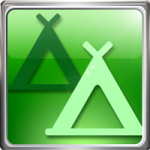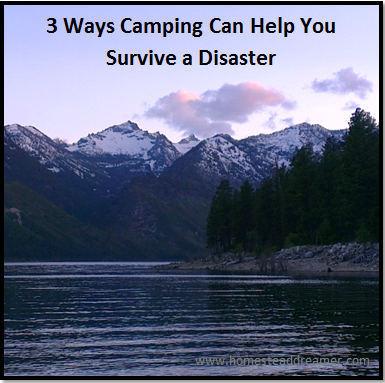A couple of weeks back, I read a really great quote. It said, “Preparedness is what makes survival feel like camping” (or something close to it). I really wish I could remember where I saw it to give proper credit because I thought it was a really good point of view. I think there is some truth to it in a disaster situation, at least at first. Depending on where you live can determine how long you are able to ‘camp’ for.
Those in the city have a higher chance, in my opinion, to have to bug out due to roving bands of looters, rioters, and desperately hungry people. Even having a few days to be able to wrap your head around whatever scenario you have survived can give great advantage over others who have not prepared at all. Even if you are only ‘camping’ in your home a few days, because help has come or you have to bug out, if you are a camper then chances are you have a leg up over others due your mental state, skill set, and gear. We will go into more detail on each of these areas to better illustrate the point of view.
1. Mental State. People who camp often do it primarily because they love to be outdoors. That enjoyment in itself tends to lead people into learning certain things about being in the woods and wilds. They do not view the lessons as something boring or mundane, it is a hobby and they are enthusiastic about it! They have grown comfortable in a place that is not their normal environment and there is an affinity that grows over the years. You are able to look at an area and get the ‘vibe’ off it. You are more confident and comfortable in your own skin and skills. Generally speaking, campers are really good at adapting; especially when items are forgotten and they have to either craft something that will work or learn to do without.
This adaptability trait is invaluable when it comes to a disaster situation. People who are comfortable in the forests, deserts, and other climates have tuned in to their instinctual need to be aware of everything around them. This, too can and will help you in avoiding bad situations whether you are in the back country or the middle of downtown New York City. Camping can help you survive a disaster because of the ‘training’ you have learned and adopted through research, testing, trial and error. This brings us to the second way camping can help you survive a disaster: Skill Set.
2. Skill Set. I listed mental state first with good reason. If you are unable to handle the chaos that is unfolding in a disaster and make decisions rationally, nothing else really matters. Now, I am not saying that by camping you will magically be able to handle something like martial law and soldiers kicking your door in. What I am saying though, is that even though camping is a hobby or perhaps even your way of life, there are situations that you will have to face and overcome that a pure city dweller would be hard pressed to grasp, process, or handle.
For example: You are camping in a remote location and it is pouring rain and the wind is blowing it sideways. Your tent pole breaks in the middle of the night. What do you do? You cannot just toss it all in the car and go, you have to adapt and overcome! To some of those reading this, your brain is already going though the steps you would take to fix it and get back to bed. For others, they are sitting here wondering just what would they to do tackle the problem. If you really think about it, even people who ‘car camp’ have still learned:
- Shelter building. Even with a tent, you are being exposed to frame structure methods used and could take your knife, hatchet, or axe and chop some branches down to serve as a pole or simply pile them up as a lean to.
- Fire starting. Sure, most people use some kind of lighter or matches to start fires and light lanterns. Most campers have multiple back ups of these in case some get wet. Then there are people like myself who, because we love camping so much, are learning about how to craft and use a fire-bow or bow-drill. At the very least, campers have an understanding of how to start and maintain a fire. Avid campers go even further in learning or devising different types of fires for different purposes. Think a cooking fire versus a heat fire versus a smoky fire.
- Heightened Awareness. To elaborate on this topic mentioned above, when you are out camping, it is natural to start keying in to the sounds around you. If all the little birds and squirrels stop making their usual noises, it gets very quiet and you tend to notice. Perhaps not consciously at first, but you will when the hair on the back of your neck stands up. 😉 Campers usually enjoy the quietness of the wilderness and when something breaks that silence, they notice. That can literally mean the difference between life and death. You may not be able to stop an attack from happening, but every second’s warning and reaction time you get can be used to handle or avoid the threat.
- The Basics and Bits of Other Skills. Most people tend to camp in the same climate over and over. Over time, they will gain some basic skills that are unique or more important to their preferred locations. Using myself as an example, I can read the dirt and leaves to be able to tell which way water flows when we get a good rain storm and place my tarps and tent accordingly to avoid getting swamped. I know which direction most storms and winds come from no matter where I am on the island I live on or other outlying islands we may visit. Without using any form of gps, mind you. In Alaska, once you are a good 20 miles or so from any main community area (and towers), there is simply no signal to be had. Honestly, I prefer it that way. Other skills people may be exposed to and practice could include; finding good water in dry climates, reading the signs or tracks of dangerous animals, or rope and knot tying because you have to tie your food in a tree to keep it safe from wildlife. The potential list here could be incredibly long so I will leave it to you to consider what else may fit here for you in your situation.
 3. Gear. I put gear last again, with good reason. First, if you do not have the mental capacity to assess and react to a disaster or have the skills needed to make fire and shelter, gear means nothing! Also, there are plenty of people out there who buy all the latest gadgets and items that they end up never using and the last place you want to try and learn about your gear is in a SHTF situation.
3. Gear. I put gear last again, with good reason. First, if you do not have the mental capacity to assess and react to a disaster or have the skills needed to make fire and shelter, gear means nothing! Also, there are plenty of people out there who buy all the latest gadgets and items that they end up never using and the last place you want to try and learn about your gear is in a SHTF situation.
Campers tend to use their gear many times over which allows them to react and put survival needs into place much faster. The gear that the average camper has is usually enough to provide the basic needs such as shelter, warmth, water (either stored, filtered, or the ability to boil it), and food or the ability to cook food. Your backpacking campers will have lightweight, easy to bug out with gear and your car campers will tend to have enough stuff to build a formidable shelter of comfort compared to others. This gear can make things considerably better even if you are bugging in. The sleeping bags will help keep you warm when the heat is out, especially if you have no other options like a wood stove.
The point is that camping gear is designed for you to be able to enjoy and withstand being out of doors – essentially to ‘survive’ being out there and it can certainly help when bugging in, too. Imagine being the only person in your apartment complex who can heat water without making a fire out in the parking lot. What about being the only person who can still charge their phone and other gadgets because you bought a little solar charger?
I am really only scratching the surface of this topic but I hope it helps you to see the value camping and getting out there can be beneficial from a preparedness and survival standpoint. I would love to hear your thoughts on this and greatly appreciate you sharing it, too!





I wholeheartedly agree. Myself, I am ex military, and am in strong agreement with the order in which you prioritize your points. Mental state I think is the biggest factor that will determine how well you do in a bad situation. Keeping a cool head, having the ability to think through a situation does far more good than any gadget or gear. Gear is nice, but you learn as a camper, it can fail; more-over, fail when you ‘need’ it the most. That’s where skills come in. I have always thought it best to go out and try new things, the things you learn can be surprisingly valuable one day.
Great article, thank you for posting such a no b.s. point of view. Well done.
Thank you very much for the compliment and comment, but THANK YOU MOST FOR YOUR SERVICE!! If you liked this one, you may like another “no b.s.” article titled “No, You Can’t Come to My House.” 😉